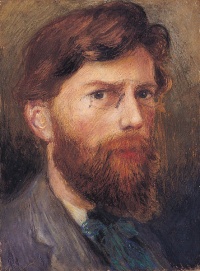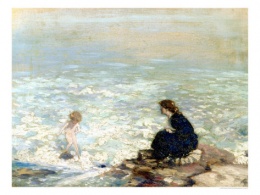George William Russell: Difference between revisions
No edit summary |
Pablo Sender (talk | contribs) No edit summary |
||
| Line 5: | Line 5: | ||
[[File:AE self-portrait.jpg|left|200px|thumb|"Self Portrait", 1903]] | [[File:AE self-portrait.jpg|left|200px|thumb|"Self Portrait", 1903]] | ||
[[File:AE Mother and Child at the Waters Edge.jpg|right|260px|thumb|"Mother and Child at the Water's Edge"]] | [[File:AE Mother and Child at the Waters Edge.jpg|right|260px|thumb|"Mother and Child at the Water's Edge"]] | ||
George William Russell was an Irish poet | '''George William Russell''' ([[April 10]], 1867 – [[July 17]], 1935) was an eminent Irish poet and essayist who wrote with the pseudonym Æ (sometimes written AE or A.E.). He was deeply affected by [[Helena Petrovna Blavatsky|H. P. Blavatsky]]'s ideas. A month before he died, AE wrote Sean O'Faolein the following: | ||
<blockquote>You dismiss H. P. Blavatsky rather too easily as "hocus pocus." Nobody ever affected the thought of so many able men and women by "hocus pocus." The real source of her influence is to be found in [[The Secret Doctrine (book)|''The Secret Doctrine'']], a book on the religions of the world suggesting or disclosing an underlying unity between all great religions. It was a book which Maeterlinck said contained the most grandiose cosmogony in the world, and if you read it merely as a romantic compilation, it is one of the most exciting and stimulating books written for the last hundred years. It is paying a poor compliment to men like [[William Butler Yeats|Yeats]], Maeterlinck, and others, to men like [[William Crookes|Sir William Crookes]], the greatest chemist of modern times, who was a member of her society, to [[Charles Carter Blake|Carter Blake]], F.R.S., the anthropologist, and the scholars and scientists in many countries who read H. P. Blavatsky's books, to assume that they were attracted by "hocus pocus." If you are ever in the National Library, Kildare Street, and have a couple of hours to spare, you might dip into "The Proem" to The Secret Doctrine, and you will understand the secret of the influence of that extraordinary woman on her contemporaries.<ref>William Kirkpatrick Magee, ''A Memoir of AE: George William Russell'', (London:Macmillan & Co., Ltd., 1937), 164-5.</ref></blockquote> | |||
==Online resources== | ==Online resources== | ||
===Articles=== | ===Articles=== | ||
*[http://www.teozofija.info/Theosophia/Theosophia_Vol24_No2.htm#AEPoetAndTheosophist# "AE" Poet and Theosophist] by Boris de Zirkoff | *[http://www.teozofija.info/Theosophia/Theosophia_Vol24_No2.htm#AEPoetAndTheosophist# "AE" Poet and Theosophist] by Boris de Zirkoff | ||
== Notes == | |||
<references/> | |||
[[Category:Associates of HPB|Russell, George William]] | [[Category:Associates of HPB|Russell, George William]] | ||
Revision as of 19:45, 29 July 2014



George William Russell (April 10, 1867 – July 17, 1935) was an eminent Irish poet and essayist who wrote with the pseudonym Æ (sometimes written AE or A.E.). He was deeply affected by H. P. Blavatsky's ideas. A month before he died, AE wrote Sean O'Faolein the following:
You dismiss H. P. Blavatsky rather too easily as "hocus pocus." Nobody ever affected the thought of so many able men and women by "hocus pocus." The real source of her influence is to be found in The Secret Doctrine, a book on the religions of the world suggesting or disclosing an underlying unity between all great religions. It was a book which Maeterlinck said contained the most grandiose cosmogony in the world, and if you read it merely as a romantic compilation, it is one of the most exciting and stimulating books written for the last hundred years. It is paying a poor compliment to men like Yeats, Maeterlinck, and others, to men like Sir William Crookes, the greatest chemist of modern times, who was a member of her society, to Carter Blake, F.R.S., the anthropologist, and the scholars and scientists in many countries who read H. P. Blavatsky's books, to assume that they were attracted by "hocus pocus." If you are ever in the National Library, Kildare Street, and have a couple of hours to spare, you might dip into "The Proem" to The Secret Doctrine, and you will understand the secret of the influence of that extraordinary woman on her contemporaries.[1]
Online resources
Articles
- "AE" Poet and Theosophist by Boris de Zirkoff
Notes
- ↑ William Kirkpatrick Magee, A Memoir of AE: George William Russell, (London:Macmillan & Co., Ltd., 1937), 164-5.